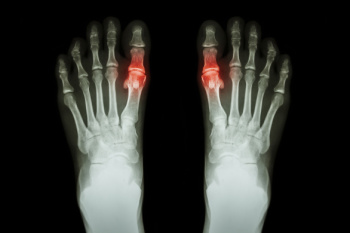
Gout is a painful form of arthritis that often affects the foot, particularly the big toe. It develops when uric acid builds up in the body and forms sharp crystals in the joints. A gout attack may begin suddenly, often at night, with intense pain, swelling, redness, and warmth in the affected toe or ankle. Gout typically progresses through three phases. The first is a flare-up, marked by acute symptoms in a single joint. The second, called intercritical gout, is a symptom-free period between attacks. The final phase, known as tophaceous gout, can occur after years of repeated flare-ups and involves hardened uric acid deposits under the skin called tophi. Risk factors include a diet high in red meat or seafood, excessive alcohol consumption, obesity, certain medications, kidney disease, and family history. A chiropodist can help by offering pain management options, depending on the frequency and severity of attacks. If you have symptoms of gout, it is suggested that you schedule an appointment with a chiropodist who can help you to manage this painful condition.
Gout is a painful form of arthritis that can affect anyone. Please consult with Emily Yu, B.Sc from Uptown Foot Care Clinic. Our specialist will assess your condition and provide you with quality foot and ankle treatment.
What Is Gout?
Gout is characterized by sudden, severe attacks of pain, redness, and tenderness in the joints. This type of arthritis is caused by a buildup of uric acid in the bloodstream. When uric acid crystallizes in a joint, often the joint of the big toe, it can bring about a gout attack.
Symptoms
Symptoms of gout include:
Sudden and severe pain
Swelling
Redness
Warmth
Joint stiffness
Joint deformity
Diagnosis
A chiropodist will ask questions about your personal and family medical history, followed by an examination of the affected joint. Laboratory tests and x-rays are sometimes ordered to determine if the inflammation is caused by something other than gout. A sample of fluid taken from your joint can show whether it contains uric acid.
Treatment
Prescription medications or injections are used to treat the pain, swelling, and inflammation. Patients with chronic gout can also use behavioral modifications such as diet, exercise, and decreased intake of alcohol to help minimize the frequency of gout attacks. Foods and beverages that are high in purines should be avoided since purines are converted in the body to uric acid. If left untreated, this painful condition can leave your joint permanently damaged and swollen.
If you have any questions, please feel free to contact our office located in . We offer the newest diagnostic and treatment technologies for all your foot care needs.
